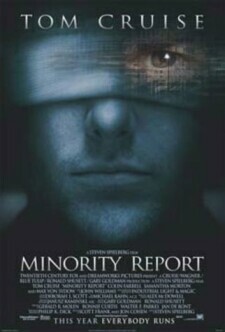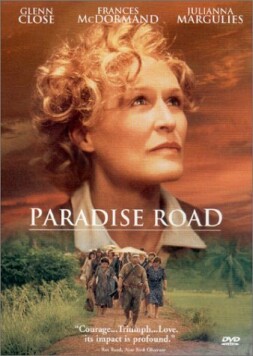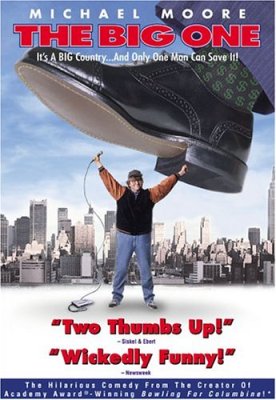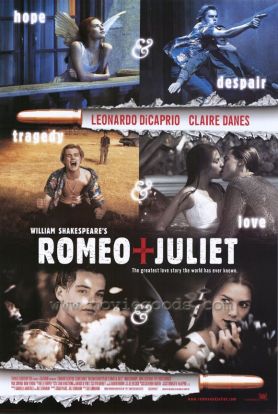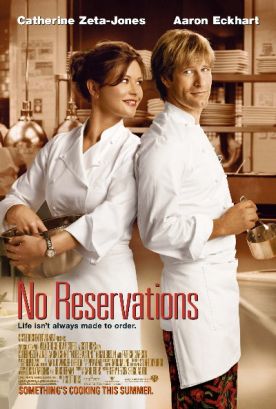Minority Report
Steven Spielberg’s Minority Report — written by Scott Frank from a short story by Philip K. Dick — starts (or seems to start) from the following premiss: suppose there were such a thing as an absolutely reliable form of clairvoyance. Fair enough, we say, and begin to make the appropriate suspension of disbelief. Oh, and one more thing, says the film. Suppose there weren’t. This is the Spielbergian idea of entertainment — and, to be fair, one that an awful lot of people are willing to go along with — first you create some kind of preposterous scenario to do with aliens or time travel or real-seeming hallucinations or some combination of all three and then, when people have adjusted to it, you remind them at unpredictable moments that none of these things exists.
It’s a bit like that great moment in Chicken Run when the aeroplane is about to take off and Fowler, the old rooster who keeps alluding to his time in the RAF has to inform the industrious hens that he can’t fly the thing. But what about the RAF? “Didn’t you fly?” they ask
“Of course not,” he replies. “I’m a chicken. They didn’t let us behind the controls of these things.”
But in the Spielbergian universe, this isn’t just a cute little postmodern joke, it is the foundation of everything.
Well, if you like that sort of thing, this is the kind of thing you will like. I myself find it impossible to take it seriously, though serious critics hail Spielberg’s essay in noir (as they see it), his getting in touch with the “dark side” with enthusiasm, or ask what are the implications of the idea of the “Pre-Crime” unit based on clairvoyance and headed by Tom Cruise in the movie for the increase in federal investigatory or custodial powers since September 11th? Someone from the BBC World Service actually telephoned me to ask this question, and I had a hard time even understanding it. What implications could there possibly be for the real world of something that not only doesn’t but couldn’t exist?
Yet the film’s great peripeteia or reversal is its hero’s shocking discovery of what every sane person in the world we all live in has known all along, namely that clairvoyance cannot be perfect and that it is unfair and unjust to punish someone for what he has not done and may never do. You’ve got to have an awful lot of faith in the power of your futuristic illusion to try something like that, and of course, Spielberg has got it. Having virtually invented the postmodern movie, he relies on the bargain that he made long ago with his mostly juvenile fans: my movies will give you all the excitement of Hollywood’s days of innocence and more if only you will agree never, ever to expect anything real in them.
And Minority Report’s philosophical problem is even more serious than its artistic one: for the whole idea of seeing into the future is undermined by the idea of the “Pre-crime” unit, which has been set up to stop it from happening. “It’s not the future if you stop it,” as Danny Witwer (Colin Farrell) sensibly points out to Mr Cruise’s character, John Anderton. If a crime is stopped, the clairvoyants have foreseen nothing. Their vision was not, after all, of the future, since the future has been altered by Tom and his futuristic cops in collaboration with three infallible psychics born of drug-addicted mothers, but only of a certain tendency, a certain constellation of feelings which, in the nature of things, can never be properly verified as accurate, since ex hypothesi, they have been cut short and forestalled.
Yet even in spite of all this, it still might have been an interesting picture if the apparent tendency of the narrative had been real. That is to say, the clairvoyants finger Chief Anderton as being a future murderer himself because, as he briefly believes, he accidentally discovers who kidnapped and murdered his young son. To have a real drama, as opposed to the kind of technological romance that Spielberg specializes in, you have to have some moral conflict. Well here it is. The incorruptible head of the pre-crime unit naturally supposes himself to be an innocent man “set up” by someone. He a murderer? Impossible! And yet in a flash of insight he realizes that he has been put into the sole imaginable situation where he could be a murderer. For one brief moment he embraces his destiny for the sake of his revenge.
But, this being Spielberg (and Tom Cruise being Tom Cruise), you know that this moral drama has got to be bogus. Our Tom a murderer? The idea is even more absurd than that of the three clairvoyants floating in their vat of high-test brain-food, whence they issue their fallible infallible predictions graven on little wooden balls. And, sure enough, the victim is not at all his son’s killer, and he has been set up. Surprise, surprise! Somewhere, as backstory, there is a sort of implicit moral drama to the account of the old and unattractive person who sets Tom up on account of his enthusiasm for the Pre-Crime unit and its contributions to social hygiene, but it doesn’t really interest Steven Spielberg.
Instead he occupies himself with gadgetry and gimmickry. The future cops have cool jetpacks, just like in a 1950s futuristic movie, and “sick sticks” that they use instead of truncheons or gas to subdue suspects. The cars are cool, though rather similar to those in A.I., and there are sentient plants bred as security devices. But best of all is the idea of advertising targeted to the individual based on the ubiquitous system of retinal scanning (which also leads to Tom’s encounter with a literally quacking eye doctor that is too tedious to go into). This produces such quintessentially Spielbergian jokes as having his hero on the run from his former colleagues in a mall and having the ads calling out to him: “John Anderton, you could use a Guinness right now!” or, from American Express, “Get away, John Anderton. Forget your troubles.”
This kind of thing reminds me of what Dr. Johnson said about Shakespeare. “A quibble,” he said, using the 18th century word for pun, “is to Shakespeare, what luminous vapours are to the traveller; he follows it at all adventures, it is sure to lead him out of his way, and sure to engulf him in the mire. It has some malignant power over his mind, and its fascinations are irresistible.” What a pun was to Shakespeare, that kind of technological irony is to Spielberg. The difference is that, as the latter is already in the mire, his will o’the wisp is not an irritating diversion to his audience but the only form of relief there is for us.
Discover more from James Bowman
Subscribe to get the latest posts to your email.

